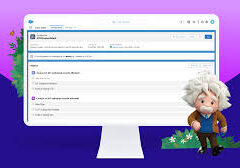Building Trust in AI: A Complex Yet Essential Task
The Importance of Trust in AI
Trust in artificial intelligence (AI) is ultimately what will make or break the technology. AI Trust and Optimism. Amid the hype and excitement of the past 18 months, it’s widely recognized that human beings need to have faith in this new wave of automation. This trust ensures that AI systems do not overstep boundaries or undermine personal freedoms. However, building this trust is a complicated task, thankfully receiving increasing attention from responsible thought leaders in the field.
The Challenge of Responsible AI Development
There is a growing concern that in the AI arms race, some individuals and companies prioritize making their technology as advanced as possible without considering long-term human-centric issues or the present-day realities. This concern was highlighted when OpenAI CEO Sam Altman presented AI hallucinations as a feature, not a bug, at last year’s Dreamforce, shortly after Salesforce CEO Marc Benioff emphasized the vital nature of trust.
Insights from Salesforce’s Global Study
Salesforce recently released the results of a global study involving 6,000 knowledge workers from various companies. The study reveals that while respondents trust AI to manage 43% of their work tasks, they still prefer human intervention in areas such as training, onboarding, and data handling.
A notable finding is the difference in trust levels between leaders and rank-and-file workers. Leaders trust AI to handle over half (51%) of their work, while other workers trust it with 40%. Furthermore, 63% of respondents believe human involvement is key to building their trust in AI, though a subset is already comfortable offloading certain tasks to autonomous AI. Specifically:
- 15% trust AI to write code autonomously.
- 13% trust AI to uncover data insights independently.
- 12% trust AI to develop communications without human input.
- 12% trust AI to act as a personal assistant.
The study predicts that within three years, 41% of global workers will trust AI to operate autonomously, a significant increase from the 10% who feel comfortable with this today.
Ethical Considerations in AI
Paula Goldman, Salesforce’s Chief Ethical and Humane Use Officer, is responsible for establishing guidelines and best practices for technology adoption. Her interpretation of the study findings indicates that while workers are excited about a future with autonomous AI and are beginning to transition to it, trust gaps still need to be bridged.
Goldman notes that workers are currently comfortable with AI handling tasks like writing code, uncovering data insights, and building communications. However, they are less comfortable delegating tasks such as inclusivity, onboarding, training employees, and data security to AI.
Salesforce advocates for a “human at the helm” approach to AI. Goldman explains that human oversight builds trust in AI, but the way this oversight is designed must evolve to keep pace with AI’s rapid development. The traditional “human in the loop” model, where humans review every AI-generated output, is no longer feasible even with today’s sophisticated AI systems.
Goldman emphasizes the need for more sophisticated controls that allow humans to focus on high-risk, high-judgment decisions while delegating other tasks. These controls should provide a macro view of AI performance and the ability to inspect it, which is crucial.
Education and Training
Goldman also highlights the importance of educating those steering AI systems. Trust and adoption of technology require that people are enabled to use it successfully. This includes comprehensive knowledge and training to make the most of AI capabilities.
Optimism Amidst Skepticism
Despite widespread fears about AI, Goldman finds a considerable amount of optimism and curiosity among workers. The study reflects a recognition of AI’s transformative potential and its rapid improvement. However, it is essential to distinguish between genuine optimism and hype-driven enthusiasm.
Salesforce’s Stance on AI and Trust
Salesforce has taken a strong stance on trust in relation to AI, emphasizing the non-silver bullet nature of this technology. The company acknowledges the balance between enthusiasm and pragmatism that many executives experience.
While there is optimism about trusting autonomous AI within three years, this prediction needs to be substantiated with real-world evidence. Some organizations are already leading in generative AI adoption, while many others express interest in exploring its potential in the future.
Conclusion
Overall, this study contributes significantly to the ongoing debate about AI’s future. The concept of “human at the helm” is compelling and highlights the importance of ethical considerations in the AI-enabled future. Goldman’s role in presenting this research underscores Salesforce’s commitment to responsible AI development. For more insights, check out her blog on the subject.













